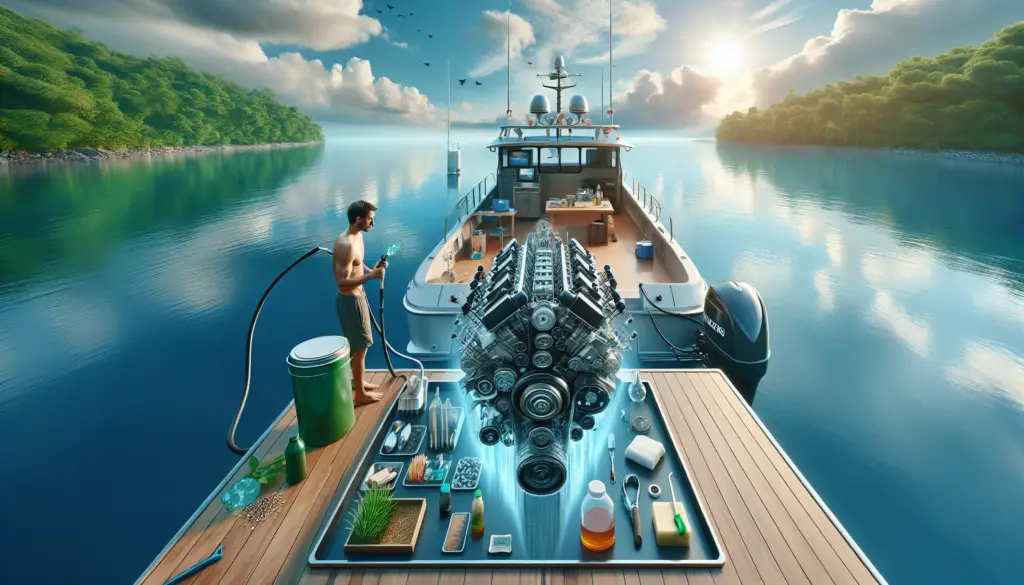Boating is an incredible recreational activity that takes you closer to nature; it can, however, contribute to water pollution if not undertaken with the right practices. “Best Practices For Minimizing Water Pollution From Boat Engines,” is an article that outlines effective strategies you can employ to minimize and mitigate the environmental impact your boat engine has on water bodies. This article is packed with actionable tips, right from choosing the right kind of engine, to proper maintenance and waste disposal methods. Each suggestion not only ensures an environmentally friendly boating experience, but also prolongs the life of your boat in the process. As you navigate your way through this treasure trove of insights, remember – every small effort counts in preserving the beauty and health of the water bodies that you cherish so much.

Understanding the Impacts of Boat Engine Pollution
Let’s dive in and talk about boat engine pollution. It’s not something you think about every sailing trip, but it’s definitely something that has an impact on our Mother Earth.
Understanding the nature of water pollution from boat engines
Okay, so what do we mean when we say boat engine pollution? Simply put, it’s all the harmful stuff, mostly chemicals, that your boat’s engine releases into the water. This can come from exhaust fumes, gas spills, and even old engines that leak oil.
Evaluating the effects of engine pollution on aquatic ecosystems
You might wonder, does a little oil or gas really hurt anything? The answer is yes, it really does. Everything in an aquatic ecosystem is intricately connected, and the introduction of pollutants from boat engines can have devastating effects on aquatic animals and plants, not to mention the overall water quality.
Analyzing the long-term impacts of engine pollutants on water quality
Over time, this kind of pollution can lead to some serious changes in water quality. Not only does it make the water unsafe for aquatic life, but it can also create health risks for humans who swim in or consume polluted water.
Engine Maintenance and Water Pollution
Let’s move on to what you can do to limit the pollution your boat engine produces. One of the first things is regular engine maintenance.
The importance of regularly maintaining your engine
Just like your car needs regular service, so does your boat engine. Regular maintenance can prevent oil and fuel leaks, and also ensure that the engine is burning fuel efficiently, thus reducing the amount of pollution it produces.
How to properly clean and care for your engine
Proper cleaning and maintenance involve things like changing the oil, inspecting for leaks, and using clean, high-quality fuel. And remember to dispose of old oil and other engine fluids properly – don’t dump them in the water!
How regular maintenance can minimize pollutants
By keeping your engine in tip-top shape, you will not only have a more reliable ride, but you’ll also reduce the amount of toxic pollutants being released into the water. And that’s a win-win if you ask me.
Fueling Best Practices
Next up, let’s talk about fueling your boat. There are several ways to make this process more environmentally friendly.
Choosing the right fuel to minimize pollution
Not all fuel is created equal. Some types are cleaner burning than others. Look for options that have fewer pollutants and are labelled as being eco-friendly.
Preventing spills during refueling
Here’s where you need to be extra cautious. To avoid spilling fuel in the water when you’re filling up, make sure you know exactly how much fuel your tank can hold and don’t exceed that. Also, use a sponge or other absorbent material to catch any drips.
Disposing of leftover fuel properly
What to do with that extra fuel you didn’t need? Don’t dump it in the water or down the drain. Check for local disposal or recycling options. Many areas have facilities where you can drop off excess fuel without damaging the environment.

Efficient Engine Operation
Another way to reduce the pollution from your boat engine is to operate it efficiently.
The link between fuel efficiency and pollution
Here’s the thing: the more efficiently your engine runs, the less fuel it uses. And less fuel means less pollution.
Maximizing engine performance to minimize pollutants
There are a number of ways to get your engine running at peak performance. This could include regular tune-ups, using quality fuel, and maintaining the proper speed while boating.
The benefits of using efficient propellers
Propellers also play a role in engine efficiency. Using the right size and type of propeller can help your boat run smoothly, reducing strain on your engine and consequently reducing emissions.
Use of Engine Additives
Engine additives are another tool in the fight against water pollution.
Understanding how additives can minimize pollutants
Many additives are designed to help your engine burn fuel more efficiently, which can reduce the amount of pollution it produces.
Choosing and using the right additives
When choosing additives, look for those marketed as eco-friendly or designed to reduce emissions. As with any product, make sure to follow the instructions on how to use it correctly.
Potential risks or downsides of engine additives
Additives can have downsides too. Some may not be as effective as they claim, and others might even cause damage to your engine. It’s always a good idea to consult with a professional or do thorough research before using any additives for your engine.
Safe Boat Disposal and Recycling
When it’s time to retire your old boat, do so responsibly.
The importance of avoiding water contamination during boat disposal
Improper disposal of old boats can lead to additional water contamination, especially if they still contain engine fluids or other pollutants.
How to properly dispose of or recycle old boats
Many regions have boat recycling or disposal programs. These can include dismantling the boat and recycling reusable parts or, in some cases, sinking the boat to create an artificial reef (but only under regulated and controlled circumstances).
The role of boat recycling in reducing water pollution
Through reusing and recycling, we can limit the amount of waste that ends up in our waterways. So, when the time comes to say goodbye to your old boat, make sure you do so in a way that minimizes its impact on the environment.
Educating Boaters and Stakeholders
Awareness is the key to making meaningful changes in reducing engine-induced pollution.
The importance of water pollution awareness among boaters
As a boater, you play a significant role in protecting our waterways. Understanding the impacts of your actions and making informed decisions can have a huge positive impact.
Organizing educational programs and initiatives
Consider getting involved with educational programs that focus on boat engine pollution. This could involve attending workshops, promoting educational resources online, or even organizing clean-up efforts in your local community.
How informed decision-making can minimize engine-induced pollution
When you know better, you do better. Making informed decisions on the maintenance of your boat, the fuel and additives you use, and how you dispose of waste can make a significant difference in reducing pollution.
Marine Legal Regulations and Compliance
Legislation and compliance are also important aspects of fighting engine pollution.
Understanding marine pollution laws and regulations
Being familiar with local and national laws regarding boat engine pollution is vital. Many areas have strict rules and regulations, and ignorance is not a valid excuse for non-compliance.
Ensuring compliance to minimize engine pollution
By respecting the rules and laws about safe and clean boating, you’re doing your part to maintain beautiful and healthy waterways for future generations.
Consequences of non-compliance with marine pollution regulations
Violating these rules can result in hefty fines or even legal action, but the biggest consequence, of course, is the environmental impact. So, follow the rules for the sake of clearing your conscience, your wallet, and our planet.
Eco-Friendly Boating Innovations
Technology has been increasingly playing a role in fighting pollution from boat engines.
Exploring eco-friendly marine engine innovations
Many of the latest marine engine models come with built-in features to minimize pollution, including improved fuel efficiency and lower emission levels.
Adopting new technologies to minimize water pollution
From battery-powered motors to advanced waste management systems, there are plenty of technological solutions to the problem of boat engine pollution. Don’t shy away from adopting these new technologies – they might just be the future of cleaner boating.
Leading companies and models in eco-friendly boating
Many marine companies are stepping up to the plate and investing in research and development for greener boating options. Keep an eye out for these innovators and consider their products when replacing or upgrading your boat.
Government Initiatives and Policy
Government policymakers play a role too in ensuring cleaner waters.
The role of government in minimizing boat engine pollution
Government bodies have the power to regulate and enforce rules on marine pollution, and to encourage or even reward green boating practices.
Existing policies and their effect on water pollution
Many policies have already brought about positive changes. Things like emission standards and disposal regulations have helped reduce pollution from boat engines.
Recommended policy improvements for cleaner boating
But there’s always room for improvement. More stringent regulations, better enforcement, and incentives for eco-friendly boating practices can drive the shift towards cleaner waters.
And there you have it! While preventing pollution from boat engines is no small task, with a good understanding and the right actions, we can all help maintain and improve the health of our precious waterways. So, next time you hit the water, remember: You have a role to play in preserving it for future generations. Happy and mindful boating!


[…] boat’s engine might be causing some significant environmental damage. “Top Tips For minimizing the environmental impact of boat engines” offers crucial advice for boat owners looking to reduce their carbon footprint and keep our […]
[…] eco-safe boating equipment is one of the most effective ways to reduce environmental footprints in the marine […]